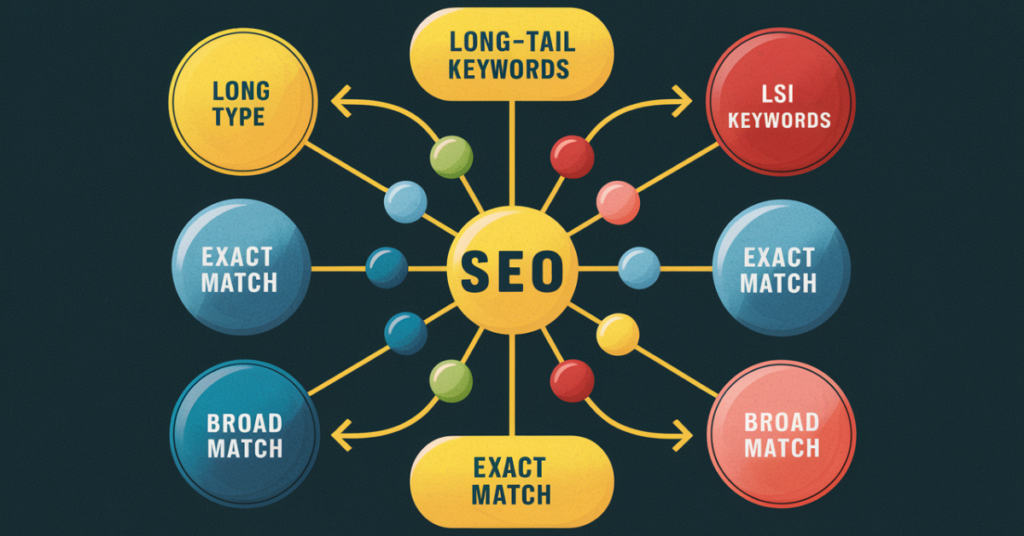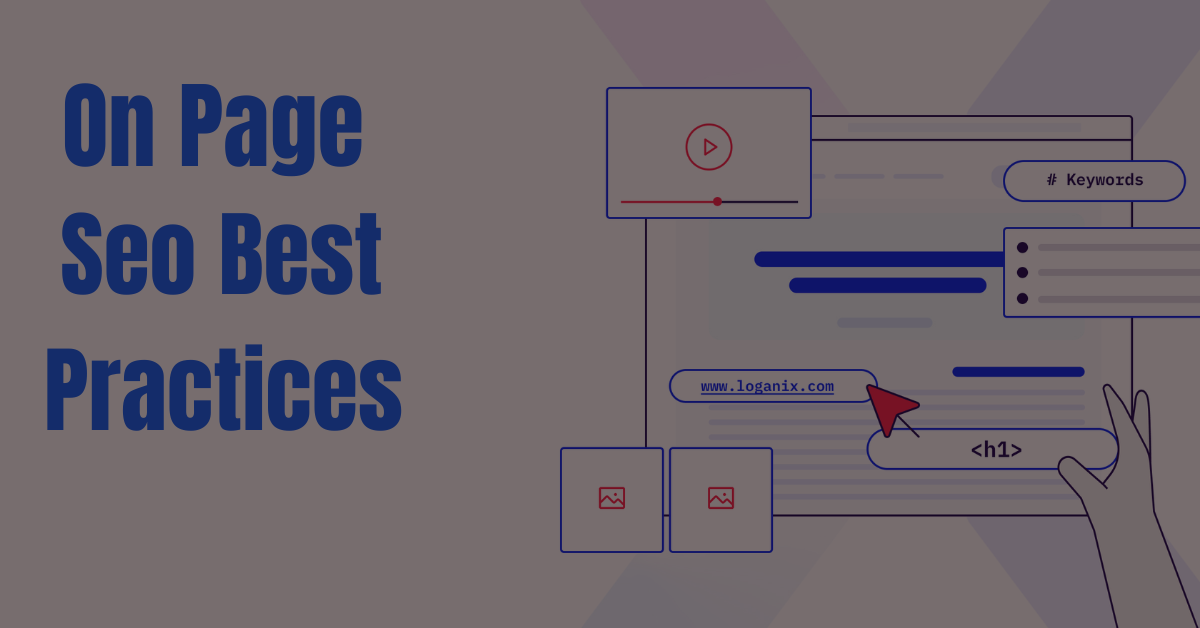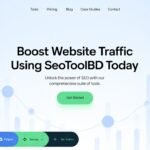
What are Keywords and SEO
Learn the secrets for you to Boost Website Visibility and Increase Organic Traffic! Nothing more than the art of keyword selection for SEO! It acts as the breadcrumbs that connect search engines directly to your electronic real estate. This blog will break down the 8 key keyword for SEO – giving you and the toolbelt to help reach that desperately desired first page of Google. So, without further delay let’s jump into knowing how these major 4 can change your game of online success! Keywords for SEO.
Broad Match Keywords
Broad match keywords: The jack of all trades keyword type They are the keywords that whenever someone searches on search engines, your website will show up in related results with your main keyword as well even if it is not an exact match. As such, it enables you for your website to be seen by more people due to this flexibility.
Although you must use broad match keywords wisely, And the latter can be a massive timesuck for your General Brand Keywords, and could drive irrelevant clicks if you are not careful. Focus on a few broad match keywords and long tail negative keywords to help guide their performance.
Regular monitoring and analysis of your broad match keywords performance is very critical. They said you can tweak your plan accordingly and make sure those keywords bring valuable traffic to your website. If you find the right balance of broad match keywords that (soon) attract a wider group, they can be a very powerful tool in your SEO arsenal.
Exact Match Keywords
SEO – Exact match keywords are an important sign of how relevant your content is to a user’s search. Websites will rank when searched for, and these search queries are exact keyterm phrases that must be included in order to have your site show up.
By sprinkling the exact match keywords in your content, meta tags and URLs, you have higher chances of getting traffic that is more filtered. So, if someone types in “best coffee shop in New York City,” having that exact phrase on your site is going to give you a higher chance of showing up as the first result when they search.
Just remember not to use exact match keywords too frequently or it will look unnatural and spammy. Instead, work the terms into high-quality content in a natural way making for better user experience and SEO performance.
Phrase Match Keywords
Using phrase match keywords can be a god-send when it comes to SEO. These keywords help to target exact phrases that your potential visitors type in while searching on search engines. When you add quotation marks around a keyword phrase. Search engines will only return your content if the exact same keywords are entered in that order.
Phrase match keywords are a happy medium between broad and exact match, allowing you to target your content more selectively. The search intent is clearer and this type of keyword targeting can assist you in attracting more qualified leads to your website.
For instance, if you are offering handmade jewelry and keyword that we have a phrase match for is ‘handmade silver earrings’. Builds customer readiness to buy, and decrease competition ads.
Making sure that those keyword phrase matches sprinkled around your content can help boost organic traffic to your site. You can see for yourself, favouring these targeted phrases is no small asset to your SEO plans!
Keywords with a long tail
Keywords that contain a long-tail are hidden treasures in the SEO world. While these phrases might not have a lot of search volume, they can be very valuable for targeting to specific niches and bringing in highly relevant traffic.
Broad match keywords, as the name implies, are like using a… broad net to catch fish. Meanwhile long-tail keywords target only specific searches and result in high quality leads or consumers finding you online. They tend to represent user intent closer towards converting. Inquiring after more detail over a search query, so are very important for capturing core users.
Long-tail keywords – If you use long-tail keywords in your content strategy, then not only are you going to increase the probability of ranking higher on search results but also improve user experience overall on site as well. Considering long-tail keywords specific to those queries would help you tailor the content more effectively around your target audience needs and interest.
Using Long-Tail Keywords In SEO Takes Practice You have to understand the keywords. Terms that resonate with your audience, then use them strategically throughout your web content. Long-tail keywords are going to help you attract qualified visitors and improve engagement over time.
Latent Semantic Indexing (LSI) Keywords
That is quite a mouthful… LSI (Latent Semantic Indexing) Keywords are important to make sure that all of the words on your website serve some purpose in optimizing it for search engines. They help search engines know better what the marketing context of your webs content is, so Google will have more chance to rank you higher in SERPs.
When you naturally add LSI keywords to your content, search engines are let known that the page is thoroughly detailed. For instance, if your strategy word is digital marketing then LSI can be “social media tactics” or Smart of SEO.
But, using LSI keywords results not only in improved SEO but also offers valuable information and provides more meaningful data to the user. It is providing the link an outline of how search engines should move throughout your content.
Using LSI keywords smartly can help you add more power to your SEO efforts because it helps in increasing the authority of content while helping search engines find out what your page, posts or website is talking about and how much value these contents provide on a keyword basis.
What Are Branded and Non-Branded Keywords
One of the keys to success with SEO is knowing when to use branded vs. non-branded keywords in your campaigns. Branded keywords are terms that mention your company name or the products and\or services you offer. Firmographics are similar in that they tie directly to your brand, and can draw traffic directly back to your website.
Non-branded keywords, on the other hand, are less specific and typically encompass more general industry-related terms or solutions your business offers. Serviced-based – these generally have more competition as well, but they might draw a wider audience.
So including both of these in your SEO strategy is important to be able to target all user intents that you want. Use branded keywords to drive brand visibility and loyalty, while using non-branded ones for greater reach including new customers not yet familiar with your offering.
Balancing both – branded AND non-branded terms will ensure a constant stream of organic traffic to your site.
Understanding of Negative Keywords for SEO
One key component of any effective SEO strategy is negative keywords. These are the keywords that you do not wish to have your ads placed. Thus saving you money and increasing campaign relevance. Negative keywords help you to target better. Negative words may exclude irrelevant search terms which otherwise are not filtered away from your targeting.
Context is key: You might even think that embedding the term “cheap”. “Affordable” in your keyword strategy is a great idea to appeal on lower-cost. watch buyers, but if you are selling high-end watches then don’t put those search terms. Making sure your ads are being shown in front of users which have higher chances to convert into customers through this.
Optimizing your SEO campaigns also requires a consistent review and updating of your negative keyword lists. Keeping an eye on these search terms will help identify relevant negative keyword variations, improving campaign performance and increasing ROI.
Different types of Keywords How to select Right Words for Website
Selecting the appropriate keywords play a significant role in an effective SEO campaign for your internet site. Do keyword research with tool like Google Keyword Planner. Find other related terms that you can include in your content.
Is the keyword too competitive? Utilize some broad match, exacts and phrases in a balanced keyword list with long tail keywords & LSI to reach wider audience while keeping the relevance intact through your strategy.
Choice Between Branded vs Non-Branded Keywords: Branding, User Trust Negative and exact-match keywords will help filter out unrelated traffic as well, adding further boost to your conversions.
Regular check keyword performance needs adjustments to ensure the continued competitiveness in search engines. Selecting the optimal blend of keywords is an art and a science-both roles you must fulfill from the get-go, as well as over time.
How to Do SEO Keyword Research
Conclusion
If you want to optimize your website and attract organic traffic, its really important that u have a proper knowledge about keywords for example the different kinds of it. Use a combination of broad match, exact match, phrase matching and long-tail matches at your URL level or LSI keywords (branded + non branded) should also be targeted as negative KW types; the door will open to using other targeting tactics in SEO for rankings once again. By doing regular checks on your keyword list and making tweaks depending on the current trends, you can always stay ahead of algorithm changes. Having the proper types of keywords at your disposal will help create that path for visibility and bring in those leads.

I have been in the SEO industry for more than 9 years, with skills and attitude that are geared towards improving the online presence of your website on search engines such as Google and Bing. Currently, I am Margaret Dalton digital working as a Lead Analyst in a Fortune 50 company, and at the same time, I was working as a successful SEO Freelancer to help websites of any sizes to get on top of the search engines.
![[What does SEM stand for]-Search Engine Marketing [What does SEM stand for]-Search Engine Marketing](https://margaretdaltondigital.com/wp-content/uploads/2024/06/a-digital-illustration-featuring-a-modern-office-s-OLMArZUBQd27AKULvDYFTA-8NYm5kz8QAOebtRSeeaDjg-150x150.jpeg)




